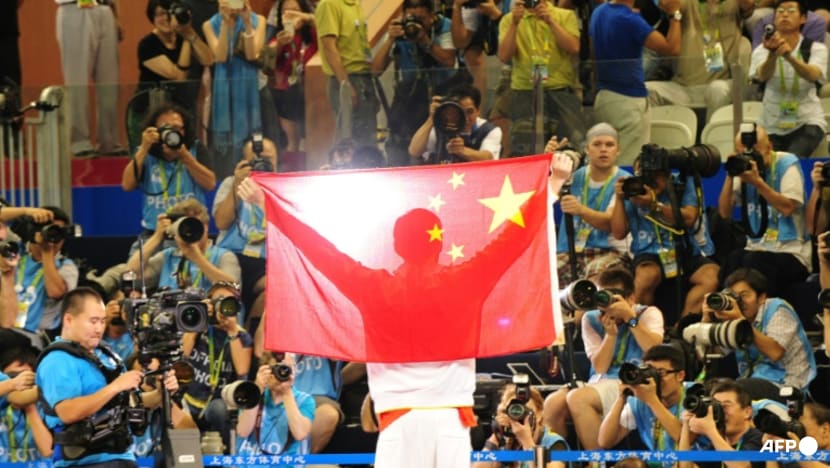CNA Explains: China's swimming doping scandal – is politics involved?
China has a history of swimmers caught for taking banned substances, but are their athletes being "unfairly singled out" as Beijing claims?

A host of Chinese swimmers failed doping tests before the Tokyo Olympics, but were allowed to compete based on China's findings they had ingested it unknowingly. (File photo: AFP/Mark Ralston)

This audio is generated by an AI tool.
SINGAPORE: With three months to the Paris Olympics, the sporting world has been hit with revelations that 23 Chinese swimmers consumed a banned drug ahead of the last Games in 2021 – and were allowed to compete anyway.
Here’s a breakdown of what happened and why.
What's the drug involved?
It was reported that the athletes tested positive for a prescription heart drug, trimetazidine (TMZ) – which can enhance performance – at a domestic meet in late 2020 and in the early days of 2021. The Tokyo Olympics were held in July and August 2021.
TMZ has been on the World Anti-Doping Agency's (WADA) list of banned substances since 2014, and is prohibited for use in and out of competitions.
Quoting Dr Kelly Johnson-Arbor, a medical toxicology physician at MedStar Georgetown University Hospital, Reuters reported that TMZ could "theoretically” help an athlete’s heart function better if they’re competing in a highly exertional sport, where a lot of energy is used and the heart is put under significant stress.
What were the findings?
According to Chinese investigators, trace amounts of TMZ were found in the kitchen of a hotel where the athletes were staying.
WADA was notified in June 2021 that Chinese anti-doping authorities had accepted that the swimmers had tested positive for TMZ after “inadvertently being exposed to the substance through contamination”.
In reviewing this, WADA consulted with independent scientific experts to test the contamination theory, as well as whether low doses of the drug could have benefited the athletes during competition.
WADA ultimately concluded that it was "not in a position to disprove the possibility that contamination was the source of TMZ”.
Related:
Why were the swimmers allowed to compete?
WADA and swimming's governing body World Aquatics decided not to take action due to "a lack of any credible evidence" to challenge China's version of events.
Chinese anti-doping authorities, meanwhile, determined that the swimmers had ingested the substance unknowingly from tainted food and that no action against them was warranted.
The affected athletes included nearly half of the swimming team that China sent to the Games in Japan, with several going on to win medals, including gold.
Many are expected to be in contention again at the Paris Olympics in July and August this year.
What's been the reaction?
China's government has stepped in to decry the reports as "false information", with foreign ministry spokesman Wang Wenbin emphasising Beijing's “zero-tolerance attitude toward doping".
Chinese state media Global Times also published an op-ed on the same day, questioning the “foreign media’s intention to discredit Chinese swimmers as the Olympics approaches”.
The United States Anti-Doping Agency (USADA) meanwhile has demanded an investigation into WADA’s handling of the tests, claiming that the global body and its Chinese counterpart had swept the positive tests "under the carpet" in a "potential cover-up".
"The whole situation is a tragedy for clean athletes around the world," USADA chief Travis Tygart told Reuters. "They should have announced the violation; they should have disqualified the athletes."
In response, WADA has threatened legal action. It also pointed to a 2014 case on US soil as precedent and an example of group contamination related to food or environment.
Related:
Have there been Chinese swimmers involved in doping?
In 2020, three-time Olympic champion Sun Yang was found guilty of refusing to give a doping sample and banned for eight years by WADA.
He had reportedly smashed vials of blood during a doping test in 2018, which he still disputes. Sun later succeeded in appealing to reduce the ban.
Seven Chinese swimmers also tested positive for steroids at the 1994 Asian Games in Hiroshima. And in 1998, Yuan Yuan was banned after customs officers uncovered a large stash of human growth hormone in her bags at the World Championships in Perth.
An article in The Guardian over the weekend drew a link between these cases and coaches from East Germany's state-sponsored doping regime, who went to China in the late 1980s to help set up high-performance training programmes.
Is there a political element?
The Guardian reported that in the wake of the 90s doping cases, Chinese officials had complained of Sinophobia, racism and ignorance of Chinese swimming culture.
On Sunday (Apr 28), Chinese state media Xinhua ran an article citing a commentary by two Australian scholars, concluding that its main point was that “Western observers tend to single out China in an unfair way”.
The commentary, first published on The Conversation, argued that "when it comes to China, many observers are quick to name and shame athletes, viewing every news story as some kind of proof the country must have a systemic, state-sanctioned doping programme".
And the latest case comes amid an intense power struggle between a rising China and US whose dominance is being challenged, wrote the two sport academics from the University of Canberra.
But Dr Lim Tai Wei, an adjunct senior research fellow at the National University of Singapore’s East Asian Institute, said that beyond possible podium protests and further questions about testing procedures, this doping scandal was “unlikely to become a major strategic flashpoint” between China and the West.
There are many other more significant issues demanding attention, he said, pointing to disputes in maritime and tech to name a few.
Yet, such tensions often "strongly" correlate with athletic rivalries, said Assistant Professor Benjamin Ho from the S. Rajaratnam School of International Studies.
"Sport and politics often mirror one another in ways ... there may be reputational costs for the Chinese.”
















